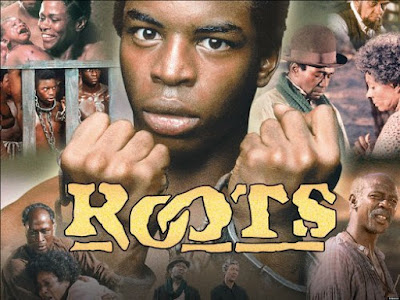This Is the Remix: The Reboot of Roots Part I
 |
| Title Sequence of the original Roots miniseries |
African
people are the vanguards of European society and the commodification of their
bodies initiated what we now know as the “Transatlantic Slave Trade.” The
continent of Africa was rich in minerals, gold, salt, diamonds, etc. European
merchants developed an interest in what they called “The Dark Continent” after
being exposed to the prosperity supported by organized regimes under the Ghana
and Mali empires. It is important to understand that the colonization of Africa
was strategically orchestrated. African people valued the humanity of
Europeans. Africans welcomed European
merchants and they shared a diplomatic relationship based on trade. European
merchants explored the land and studied the culture of Africa. They took
extensive notes in travel logs while making observations. There were two
observations that resonated with European merchants. First, Europeans examined
the approximate times of social gathering and absences. They paid close
attention to the times when women and children would be left alone at the
villages because the men were hunting and participating in daily activities.
Second, European merchants observed the tradition of African slavery. Slavery
in Africa was based on debt, warfare, and criminal activity. Prisoners of war
and criminals were enslaved in Africa; however they were paid for their labor
and were able to obtain their freedom once their debt was paid. However, this
institution evolved when Europeans negotiated with African slave catchers and
African monarchs to create a labor force in exchange for trading goods.
Eventually European merchants obtained a valuable product “gun powder” they
used guns and the aid of African slave catchers to kidnap innocent Africans
that were not prisoners of war or criminals. Unfortunately Africa’s benevolence
would lead to its demise and ingaurated the prominence of Europe’s offspring
America and Great Britain.
There were eight steps that supported the process of The Middle Passage. These are the following steps the moment of capture, march to the coast, holding cells, transfer to the ships, The Maafa (The Middle Passage), the seasoning process, the auction block, and ultimately arrival at the plantation. Marcus Rediker author of, The Slave Ship: A Human History provides insight on the enslavement of Africans. Approximately between 1700 and 1808, British and American merchant ships gathered Africans from specific regions on the continent such as, Senegambia, Angola, Sierra Leone, The Gold Coast, and The Windward Coast. The strongest, youngest, healthiest, and most intelligent African men were captured; eventually women and children were captured as well. Upon capture they were forced to march to the coast while being shackled with chains around their necks and feet. The “trade winds” influenced when and how the ships would sail. When the ships were not able to set sail on the waters, the enslaved Africans were often held in housing units. The living conditions were deplorable on the ships. African men and women were subjected to reside in an unsanitary environment they were not able to move their bodies so they resided in close quarters with feces, urine, and blood. On the ships diseases spread immediately.
Unfortunately,
in addition to force feeding and beatings, enslaved Africans were jettisoned
and sexually abused. Jettison is the way in which enslaved Africans were thrown
from the ship with shackles on their ankles. Another assertion made by Marcus
Rediker is that the ecology of the ocean evolved because sharks followed the
ships. The sharks became accustomed to consuming human flesh, African flesh in
particular. Sexual abuse was rampant during the Middle Passage; many women were
used as “bed warmers” and “belly warmers” to satisfy the sexual desires of the
captain and the crewman. Sexual abuse was not limited to African women; African
men and young boys in particular. This functioned as a method to establish
dominance and to maintain white male patriarchy would prevent insurrections on
the ships and the plantation. Another reason white men raped black men was as a
method to insight insecurities into the black man’s psychology. Vincent Woodard
author of, The Delectable Negro: Human
Consumption and Homoeroticism within US Slave Trade Culture expounds on
this notion by asserting that this violation of the body made the black man question both his regenerative
power and virility. In the context of the white man’s psyche in this sexual
violation he is intimidated by black men’s phallic and virility so he must
assert himself as the supreme man, initially the closest individual to “God.”
Prior
to the arrival on the plantations enslaved Africans were involved in the
“seasoning process” the Africans that survived those long voyages were
malnourished and needed to be presentable at the auction block. This is how
many black people arrived in the Caribbean islands of Cuba, Trinidad &
Tobago, and Haiti as well as South American countries such as Brazil and Colombia. These
islands had vast natural resources such as fresh fruit, vegetables, and clean
water that would provide nutrients for the enslaved Africans. They were
“fattened up” until their physical attributes became aesthetically pleasing to bidders
at the auction block who would become their plantation owners and overseers.
Following the seasoning process the Africans were transported to the
plantations.
Plantation
owners had managed a system for the Africans they wanted to purchase. Said
differently, plantation owners determined the value of an enslaved African man
or woman based on their physical features. The enslavement process established
the American tradition of sexualizing the black body. Plantations owners
preferred to purchase African men that had natural brute strength, muscles, and
a large penis. These men were used for breeding purposes. While a curvaceous
black woman with large breasts and buttocks satisfied the sexual desires of
plantation owners. It is important to know that both black men and women were
sexually exploited on the plantation. Sometimes black men were ordered to rape
young black girls on sex farms and her screams of agony excited white men. Black men and young black boys were also sodomized on the plantations as well. Vincent
Woodard argued that many plantation owners received sexual excitement from the
dominance and violation of black bodies.
The
Transatlantic Slave Trade revealed the blind benevolence and arrogance of African
people. African monarchs were willingly to sell their own people by impressing
the Europeans with their power and pursuing coveted trade materials. Europeans
were impressed the notion that African monarchs seemingly had no interest in
value and safety of their own people. This created an opportunity for
exploitation and divisive relationships. Africans were enticed by new business
ventures and initially aided Europeans in displacing the material wealth of
Africa. Africa’s most precious resource was her people she displaced her
communal sensibilities and most importantly her spiritual sensibility.
 |
| Jet Magazine cover of the Roots miniseries in 1977 |
On January 23, 1977 the miniseries Roots aired on television. The miniseries was based off Alex Haley's book Roots: The Saga of an American Family. The story focused on the life Kunta Kiente , an African teenager brought to America to be enslaved, and the story follows his life as well as generations of his family. Many critics argued that this miniseries had a profound impact on American citizens. It opened a wound that has yet to heal. The miniseries depicted the moments of capture, the Middle Passage, and life on the plantation. Now I must admit the miniseries did not display every brutal aspect of the enslavement of African people. I thought it was important to share the information I learned in graduate school. Thirty nine years later the miniseries has been revamped for a new audience and premiered on May 30, 2016. So far the series drew 5.3 million viewers.
Toni's Thoughts: Personally I was upset when I found out there would be a remake to the miniseries. I believe it is insult to the work of the original cast members. There has also been backlash from African Americans and African American entertainers such as Nick Cannon and Snoop Dogg also now known as Snoop Lion. If you not seen Snoop Dogg's rant about the reboot of Roots watch the video on his Instagram page. Snoop Dogg argued that we should boycott Roots and stop focusing only on slavery. He believes there should be images of the positive portions of the black experience. He received criticism from television and radio host, Roland Martin, of TV One's News One Now. I respect Roland Martin and his work and some of the points he made were accurate. I cannot everything with all of his criticism towards statements of Snoop Dogg. Both men shared thought provoking opinions. Roland Martin suggested that the Jewish community does not complain about films and television shows focusing on The Holocaust in Germany. That is a sound counter argument but the Jewish community holds power in almost all forms of media so they are able to release various forms of representation that reveal assorted subjects within the Jewish experience. Roland Martin also probed that the Jewish community teaches their children to never forget this horrible experience. The last compelling argument is that many people want to ignore slavery and not discuss in politics or classrooms. I totally agree with that.
Slavery is an important piece of history that cannot and should not be ignored. More black children need to be aware of the enslavement of African people. Some states are attempting rewrite history and suggest that enslaved Africans were migrant workers and slavery lacked brutality. I believe that is scary and extremely offensive. Many people especially black people are not aware of all of the challenges their ancestors endured. Also we must always study and examine slavery because it has shaped our social, religious, educational, and political dynamics in our contemporary society. I believe more narratives about African enslavement should be seen and taught. However, there are so many subjects that need to be seen on the big and small screen. We have to be cautious about supporting films and television shows that focus on slavery because there are times when the director and producers lack cultural competence. Quentin Tarantino criticized the original Roots miniseries but was the creative force behind Django Unchained. I believe that Kerry Washington, Jamie Foxx, and Samuel L. Jackson are amazing actors but that movie was terrible. One film I believe everyone should support is Birth of Nation: The Nat Turner Story which was written, directed, and produced by actor and activist Nate Parker . He is a native of Virginia has done thorough research on the project. I believe he is capable to produce and write more films. Although I still believe we need more film and television series that reveal all aspects of the black experiences. For example, I believe it would be nice to have a miniseries or a film acknowledging the history and contributions of Historically Black Colleges and Universities ( HBCUs). I admit some people want to remain ignorant about slavery in the black community but on the other hand some people just want to see different stories told about the black experience. I can understand the frustration. The next post focuses on why I am opposed to the reboot of the miniseries. I am sorry that this post is so long but I believed this was information worth sharing. I have heard and seen many people make suggestions on television and on social media suggesting that black people should support independent films and television shows on YouTube. I will share a link to a blog called The Ratchedemic by Marcus Haynes. His blog posts discusses shows and films black audiences should support.
Sources
The Slave Ship: A Human History Marcus Rediker
The Delectable Negro: Human Consumption and Homoeroticism within US Slave Trade Culture Vincent Woodard
Here is the link to the blog by Marcus Haynes "The Ratchedemic"
http://www.mhaynes.org/jan15-spotlight





Comments
Post a Comment